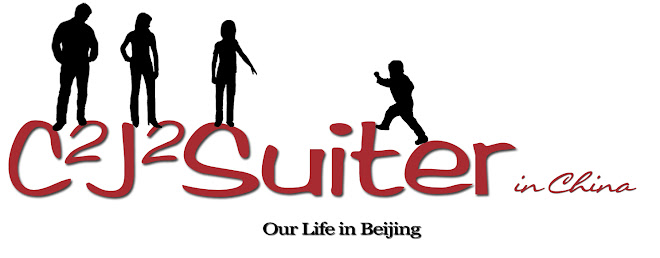Business as usual for Beijing copyright pirates during Olympics
UPDATE (Celine’s Note): “It’s been reported that 383,000 000 RMB (38,300,000 €) had been spent at the “Silk Market” during the Olympics. Eight times as much as that spent during the same period last year”. Now what I want to know is do they actually sell 8 times more items or did those Olympics tourists got “rip off” 8 times more!.BEIJING (AFP) — China has muffled dissidents and thinned out its notorious traffic for the Beijing Olympics, but its brazen peddlers of counterfeit goods are proving tougher to bring to heel.
Despite a half-hearted crackdown meant to curb embarrassing copyright theft during the Games, sellers of China's vast array of counterfeit goods say they are ringing up bumper sales to bargain-hunting Olympic visitors.
Some spruikers are even brashly wearing counterfeit versions of the blue and white Olympic volunteer shirts now-ubiquitous in the city.
"Business is good. We've got a lot of new customers now due to the Olympics," said a young woman who gave only her surname, Wu, selling pirated Dolce & Gabbana, Polo, and other clothing at Beijing's Silk Street market.
Merchants at that and other fake-goods emporia had reported a crackdown in recent months as Beijing moved to sweep the city's less-savoury elements such as prostitution under the rug during the Games.
But despite finding a slightly less varied selection, several shoppers said it looked like business as usual.
Many shoppers running the gauntlet of pushy vendors in Silk Street's narrow corridors did so with the official yellow badges of Olympic visitors hanging from their necks.
"It's the same as before except the vendors seem a little more polite. But the prices are higher too," said Kristian Joergensen, 28, a Danish teacher whose brother-in-law competed for Denmark in archery in Beijing.
Joergensen, who visited the market six years earlier, bought 10 pairs of Dolce & Gabbana underwear for 175 renminbi (25 dollars).
"Then we saw someone else selling them at 10 pair for 50 yuan. Oh well," he said.
China is awash in counterfeit DVDs, fake brand-name clothing, shoes and handbags, infuriating China's trading partners who say Western firms lose billions of dollars in sales each year as result.
The United States filed a case against China in April last year at the World Trade Organisation over the problem.
Vendors said a pre-Olympic crackdown had shut many factories of fake goods, with authorities especially targeting luxury brand knock-offs such as Gucci and Calvin Klein.
But with the Olympics underway, knock-offs of Polo, London Fog, Louis Vuitton and other big names were openly sold throughout the city.
"You want Adidas? No problem," said a woman vendor, pulling a pair of fake Adidas trainers -- priced at 250 yuan -- from a concealed box at the Yashow Clothing Market.
The five-story complex is just 200 metres from a shiny new official Adidas store.
A store at the market selling pirated DVDs also continued operation, although it had moved from the first floor to a less-conspicuous sixth-floor room and the selection was thin compared with a few months ago.
"We'll get more next week. You come back," said a woman minding the room.
Some longtime Beijing visitors weren't surprised.
"I knew they wouldn't shut this place up. It's too much of a money-spinner," said Don Lessem, an American living in Mongolia who visits Beijing frequently and was shopping at Silk Street.
He clutched a bag containing several Armani shirts and New Balance sneakers bought for just a few dollars each.
Vendors at the complex, whose parking lot was jammed with tourist buses, brashly sported Olympic volunteer shirts to give their illicit sales a Games gloss.
"The management gave them to us to wear," one young female vendor told AFP.
"It's to show our Olympic spirit!"




